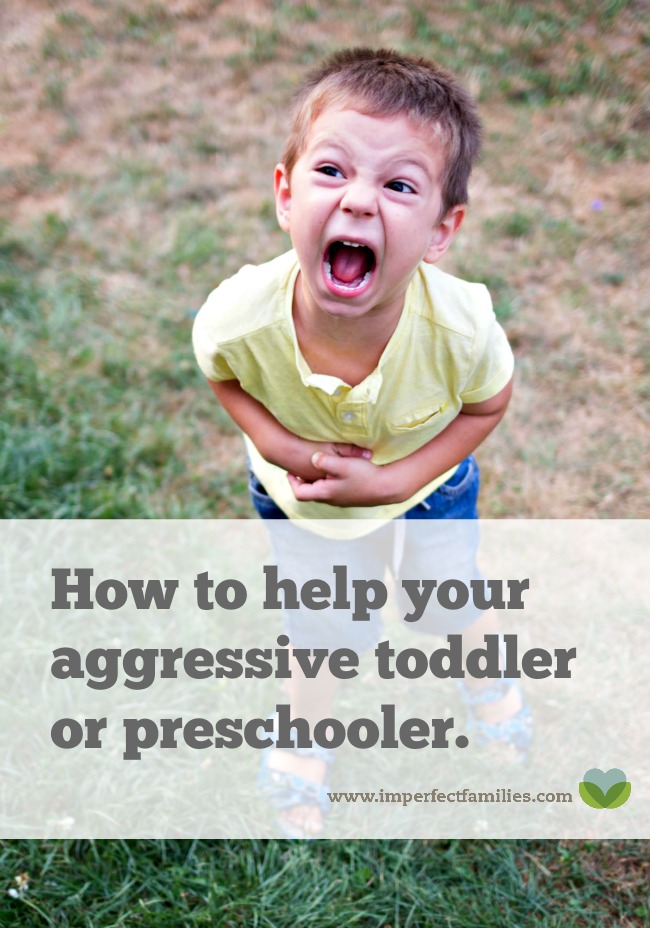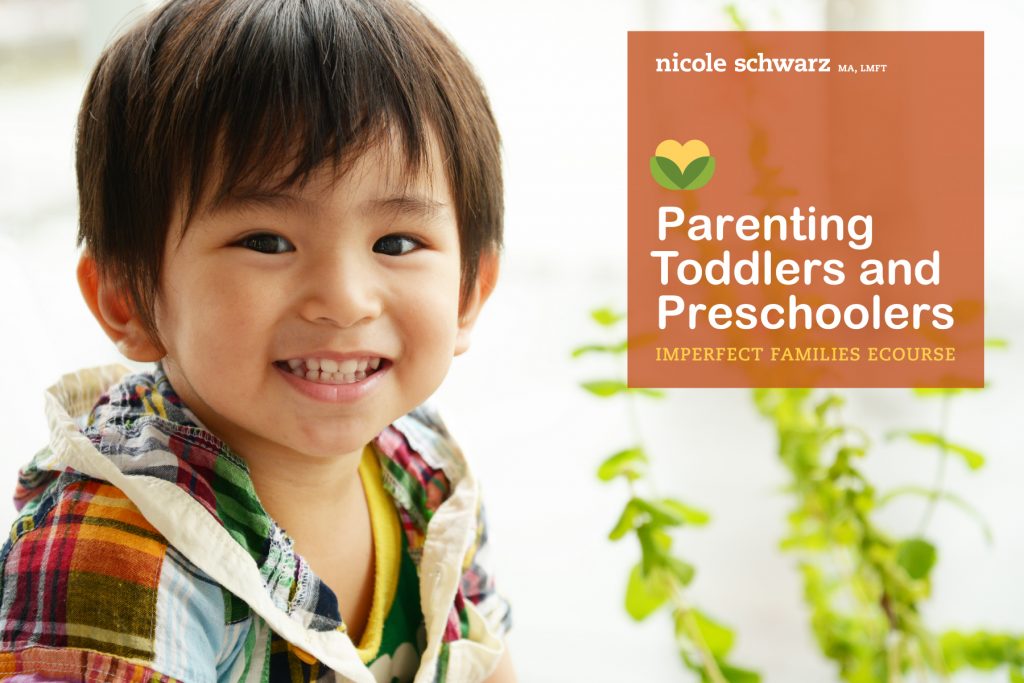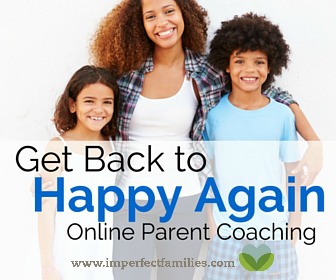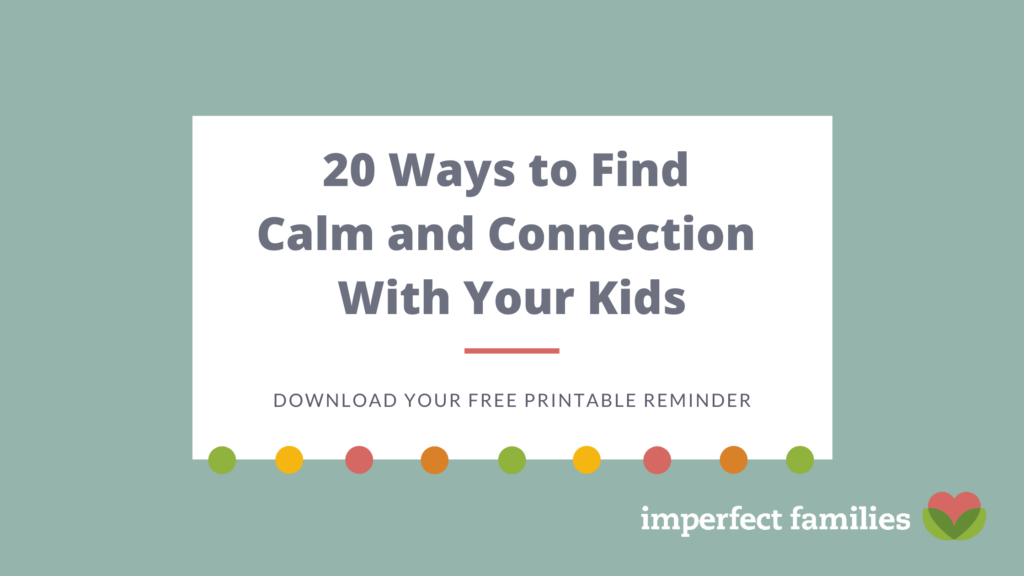
At preschool pickup, the teacher pulls you aside.
She has some concerns about your child’s behavior. She reminds you that there is a zero tolerance policy for biting and aggressive acts like kicking and hitting may result in suspension.
You’re a little shocked to hear the news, but you know what she’s talking about.
There are times when he hits his brother or throws a toy in frustration. Once, he bit a friend on a playdate.
You thought it would go away once he got a little older, but things seem to be getting worse.
The Message in the Misbehavior.
First, take a deep breath.
It’s normal for toddlers and preschoolers to have difficulty managing big feelings. Parents often mistake their child’s aggression as an intentionally mean action or an attempt to manipulate.
Instead, look at aggression as your child’s way of communicating.
Feelings can be overwhelming to a small person who doesn’t have the vocabulary to express what they are thinking or feeling. Behaviors come out sideways – kicking, hitting, and biting are all a cry for help.
It’s as if your child is saying: “I need some space!” or “I’m jealous that you are playing with that toy!” or “I want to make my own choices!”
If you want to encourage your child to express these big feelings with words – instead of hurtful actions – they’re going to need your support.
Help your Child Manage Big Feelings
Depending on your child’s age and developmental stage, they may pick up on social skills and put new vocabulary into place fairly quickly. Or it may take some time. Be patient. Walk through these 3 steps at your child’s pace.
Prepare
These steps take place when your child is calm or before they start showing signs of aggression. Take time to build these into your day to prepare your child for situations that might stir some big emotions.
- Observe: Watch your child carefully and take mental notes of things that seem to make them feel stressed, overwhelmed, frustrated or sad. Watch for patterns – do they struggle with transitions? Is a certain time of day more difficult? What things seem to be triggers – or things that always cause a big emotion.
- Use Empathy: Build your child’s emotional vocabulary by using feeling words to express what they may be feeling, “You’re so disappointed that it’s time to go!” or “You are sad to leave mommy!” Take it a step further by helping them learn what others may be feeling. Talk about people you see in books, people in your family or while you’re out. “Sara’s so happy, look at her smiling face!”
- Practice: Use everyday activities and play to help your child learn new ways to handle tough situations without aggression. Have a few Barbies learn to share a toy, use stuffed animals to practice saying goodbye or some matchbox cars to talk about taking turns. Be silly! Involve your child in the drama, demonstrating the skill, then switch roles and let them practice making a good choice.
Plan
Ok, here’s where you put your kids in situations where something might get aggressive or where they’ve been aggressive before. But this time, you have practiced and prepared.
- Supervise: Since you know your child’s triggers and challenges, you will be more aware of situations that are difficult. If your child gets overwhelmed on the playground, you’ll need to stay close and watch for signs that your child is feeling stressed. Once your child shows that they can manage this better, you can ease up on your supervision.
- Redirect: Sometimes your child needs your help to make a good choice. This may mean gently catching their arm mid-swing before it hits another child. Or, it may mean saying, “Gloria, it looks like you’d like a turn with the truck. Let’s ask Thomas if we can have a turn.” Use humor and light-hearted intervention (“Woah, we’re not going to paint other people today, silly, only paper!”) rather than punitive or critical responses.
- Intervene: Aggression can escalate quickly. Keep your child and other children safe by removing them from the situation when redirection does not help. This isn’t time-out and it’s not punishment. The child is showing that he needs more support to be successful in this situation. Be kind and supportive, but firm. “I know she is sitting in your chair, and we do not hit.”
Repair
Tension may be high at this point. Take time to calm your own anger down first, if necessary. Many people turn to punishment here, instead, I suggest using this as a time for connection and learning. Making amends for wrong-doing is an important life skill to teach your child, don’t miss out on this teaching opportunity.
- Connect: Your child may be feeling out-of-sorts, ashamed of his behavior or needing to know that he’s still a good kid. Give them a hug or just sit quietly together for a few minutes. Evaluate the child’s needs – are they hungry or thirsty – maybe a quick snack or sip of water would be helpful.
- Talk it Out: Once your child is calm, you can talk about what happened. Some kids are very articulate and have no problem talking it through, others need more support. Help them think about the situation by putting feeling words to the situation, “I wonder if you were jealous that Nate had the bigger bucket” or “It seem like your anger got really big when Kelly didn’t follow the classroom rules.”
- Fix It: Instead of forcing a heartless apology, encourage your child to think of a way to make it right with the other person. For example, they could tape the other child’s ripped project, return the ball to the other child, get a band-aid, make an “I’m sorry” card or give the other person a hug. Or, let them have a do-over, giving them the chance to try the interaction or conversation again.
Repeat
It is normal for toddlers and preschoolers to use aggressive behaviors in order to communicate their needs and wants to others. Spending time helping them build up the skills and vocabulary is time well spent. These skills may take a while to develop into habits, kids need a lot of opportunities to practice doing relationships well.
Pretty soon, though, your child may shock you in a new way. Using his words instead of actions to express his thoughts and feelings!
You should start to see a decrease in aggressive behaviors over time. However, if you feel that your child’s aggression is beyond what is “typical” for other children their age, I would encourage you to seek help. You may find that there are other factors impacting your child’s behavior – medical concerns (such as food allergies) or sensory concerns are very common. Sometimes, you just need more support implementing these strategies, a mental health counselor or parent coach is a great resource.





Comments have been turned off to retain the privacy of all families. If you have a question or comment on the topic, you're always welcome to contact me.